Casualty Loss and Disaster Relief
August 26, 2015Section 7216 Guidance and Resources
August 27, 2015With all of the day-to-day responsibilities that you are faced with as a small business owner, preparing financial reports is an easy task to overlook. If you’re not preparing financial reports, it’s impossible to know where you stand and communicate this to your lenders, investors and staff. This can lead to major problems caused by lack of understanding of your business’s true financial state, and this can mean inhibited growth and even business failure.
If you’re not creating timely financial reports, it’s time to start. As a minimum, you should be reviewing these 3 must-have reports on a monthly basis:
- Balance Sheet:Your balance sheet provides a breakdown of your assets and your liabilities and equity. The two sides of this sheet should always balance. This report can be quite simplistic but should include a certain level of detail. The balance sheet is really the report that gives you a feel for the financial condition of your business at any given time.
A balance sheet helps to assess the financial well-being of your business by providing a means for calculating your working capital. This helps you to understand if you can really handle any bumps in the road and still manage to pay your bills on time. Your balance sheet will also assist you with identifying trends so that you can make changes to your financial strategy.
- Profit and Loss (P&L) Statement:This report is exactly what it sounds like it should be. Your P&L report outlines your revenue and expenses.. This report will help you to understand your net income so that you can identify trends and project your future profits and expenses.
Your P&L statement is an important communication tool. It breaks down how you generate your income and how you manage your costs. Lenders and investors use P&L statements to determine your business’s profitability and ability to repay a loan.
- Cash Flow Statement:A cash flow report will track your on-hand assets and spell-out exactly how your cash is being spent. This report gives an overview of where cash flows in and out of your business. A business can actually be running short on cash, even while it’s generating profit.
This report is essential for recognizing the big-picture, when it comes to your business’s finances. It provides an overview of how your cash is moving and whether that cash is available as the result of profit or borrowing. Understanding the true cash position of your business will allow you to make informed operations and investment decisions.
As your business grows, you’ll want to consider running additional reports, like payroll, inventory and accounts payable and receivable summaries. Many successful businesses also provide a brief narrative report that sums up all of the individual reports and provides the reader with a snapshot of your business’s current financial state.
Your balance sheet, P&L statement and cash flow statement can be created using small business accounting software, or by tracking your financial data with spreadsheets. As your business grows and its financial systems become more complex, you should consider getting assistance from a financial professional or accounting firm. An experienced professional will format your reports so that you have all of the necessary information available to communicate your successes to investors and lenders and make sound financial decisions.
If you’ve enjoyed this article, learn more about small business finance by downloading our free eBook. It’s provides valuable information about why small businesses fail, along with tips for avoiding these fatal mistakes.

